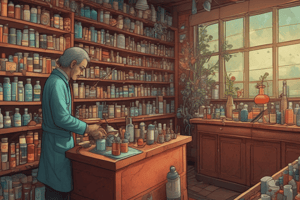Podcast
Questions and Answers
What are adverse reactions in relation to drugs?
What are adverse reactions in relation to drugs?
- Unwanted side effects resulting from exposure to a drug (correct)
- Effects that enhance the immune system's ability to recognize and destroy malignant cells
- Intended side effects resulting from exposure to a drug
- Effects caused by combining multiple medicines simultaneously
Which anticancer therapy is designed to interact only with certain proteins involved in tumor development?
Which anticancer therapy is designed to interact only with certain proteins involved in tumor development?
- Cancer vaccines
- Gene therapy
- Targeted therapy (correct)
- Immunotherapy
What do checkpoint inhibitors like PD-1 and CTLA-4 blockers do in cancer treatment?
What do checkpoint inhibitors like PD-1 and CTLA-4 blockers do in cancer treatment?
- Interact only with certain proteins involved in tumor development
- Repair damaged genes responsible for driving malignancy
- Prevent or treat various forms of cancer by promoting the development of immunity
- Boost existing anti-tumor responses (correct)
What is the primary goal of cancer vaccines?
What is the primary goal of cancer vaccines?
What is the main aim of gene therapy in cancer treatment?
What is the main aim of gene therapy in cancer treatment?
What challenges remain in cancer treatment according to the text?
What challenges remain in cancer treatment according to the text?
What does toxicology focus on?
What does toxicology focus on?
Which factor does toxicology NOT evaluate?
Which factor does toxicology NOT evaluate?
What is the main goal of anti-cancer drug development?
What is the main goal of anti-cancer drug development?
Which process does metabolism refer to in pharmacology?
Which process does metabolism refer to in pharmacology?
What is the significance of evaluating drug absorption according to pharmacology?
What is the significance of evaluating drug absorption according to pharmacology?
Why is it important for toxicologists to focus on excretion?
Why is it important for toxicologists to focus on excretion?
Flashcards are hidden until you start studying
Study Notes
Pharmacology: Exploring Toxicology and Anticancer Drugs
Pharmacology is the scientific discipline focused on studying drugs' effects on living organisms—their mechanisms of action, safety, efficacy, dosage, and interactions. This field encompasses two essential aspects when it comes to our understanding and application of medications:
- Toxicology: Examines the harmful effects of chemicals on biological systems, including pharmaceuticals, with the goal of minimizing risk during therapeutic usage and preventing unintended consequences.
- Anti-Cancer Drug Development: Concentrates on finding new compounds capable of inhibiting cancer cell growth while sparing healthy cells, thus improving treatment outcomes and quality of life for patients battling against neoplastic diseases.
Toxicological Considerations
To ensure optimal patient safety and effectiveness, pharmacologists must consider the potential risks associated with each medication. Toxicology evaluates several factors:
- Absorption: How well a substance enters the bloodstream after administration, especially oral consumption.
- Distribution: Where pharmacologically active molecules travel within the body due to circulation.
- Metabolism: Transformation processes occurring inside an organism, such as drug biotransformations facilitated by various metabolic pathways.
- Excretion: Methods through which substances leave the body via urine, feces, sweat, etc..
- Adverse reactions: Unwanted side effects resulting from exposure to a drug.
- Interactions: Effects caused by combining multiple medicines simultaneously.
When developing novel anticancer therapies, these principles become particularly vital because many current chemotherapeutic agents often cause unpleasant side effects and damage normal tissues alongside their intended target, tumorous tissue.
Advances in Anticancer Drug Development
The search for safer yet more effective treatments has led researchers down numerous avenues over recent decades. Some notable developments include:
- Targeted therapy: Utilizes molecularly targeted drugs designed specifically to interact only with certain proteins involved in tumor development, progression, or maintenance. For instance, trastuzumab is a monoclonal antibody that targets HER2 receptors expressed in specific breast cancers.
- Immunotherapy: Enhances the immune system's ability to recognize and destroy malignant cells using strategies like checkpoint inhibitors (e.g., PD-1 and CTLA-4 blockers) that stimulate the body's natural defenses against cancer.
- Cancer vaccines: Employs immunologic approaches to prevent or treat various forms of cancer by either promoting the development of immunity towards specific cancer strains or boosting existing anti-tumor responses.
- Gene therapy: Incorporates cutting-edge techniques aimed at repairing damaged genes responsible for driving malignancy while ensuring the safe delivery of functional genetic material into the appropriate target cells.
These advancements have transformed cancer care significantly, providing innovative treatment options for doctors and improved survival rates for patients. However, challenges remain, such as individual differences in response to therapy, resistance to treatment, and the requirement for continued innovation to combat the evolving nature of cancer itself.
In summary, pharmacology encapsulates both the study of toxicity and anticancer drug development. As we continue to learn more about how drugs influence human physiology and delve deeper into chemistry's potential to aid in the fight against disease, this fundamental knowledge will equip us better to address tomorrow's medical needs.
Studying That Suits You
Use AI to generate personalized quizzes and flashcards to suit your learning preferences.




